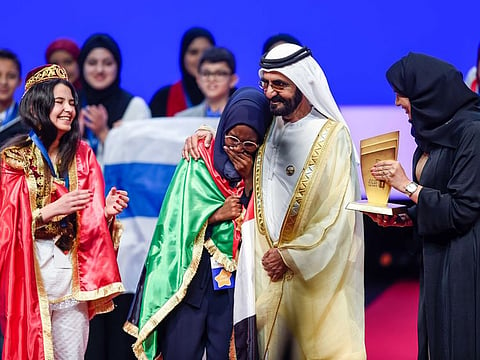Record 21 million take part in UAE’s Arab Reading Challenge
Contestants came from 96,000 schools across 52 countries

Dubai: Coinciding with the UAE Month of Reading, His Highness Sheikh Mohammed bin Rashid Al Maktoum, Vice President and Prime Minister of UAE and Ruler of Dubai, announced the new record of 21 million participating students in the Arab Reading Challenge 2020.
The UAE had declared March as the Month of Reading in 2016 with nation-wide activities that aim to spark the passion for knowledge across all society segments.
In a series of tweets, Sheikh Mohammed bin Rashid Al Maktoum said, “I’m proud of the participations in the 5th edition of the Arab Reading Challenge that marked a new record of 21 million students supported by 120,000 supervisors from 96,000 schools across 52 countries. Witnessing students compete to read in the largest-ever Arab reading initiative fills me with pride.”
He added, “Reading broadens horizons and enlightens the mind and thus, accelerates the journey towards development. The Arab Reading Challenge demonstrates our region’s capability to collectively carry out vast knowledge initiatives. We take this opportunity to thank Arab education ministers, supervisors and coordinators across the world and congratulate our Arab students upon this new level of achievement.”
Constant increase
For the fifth consecutive year, the Arab Reading Challenge participations continued to increase, drawing 21 million students from 52 countries in the 2020 edition that records a 55 per cent increase from last year’s 13.5 million students from 49 countries. Since its inception, the Arab Reading Challenge attracted more than 54 million students who summarized books they read in 50.5 million printed challenge ‘passports.’
The overwhelming increase in participations in the challenge’s 5th edition reflects the success of the Arab Reading Challenge TV show that was broadcasted last year to document the journey of 16 semi-finalists from 14 Arab countries, selected from 13.5 million students in the 2019 edition, in a move that grew community awareness around the importance of reading.
Through seven episodes, the TV show detailed the entertaining journey of the semi-finalists as they partook a series of edutainment challenges and competitions before a notable panel of judges, leading up to the 8th live episode that saw Sudanese Hadeel Anwar declared the Arab Reading Champion 2019 in a grand ceremony at Dubai Opera.
Anwar’s victory led to a threefold increase in the number of participations from Sudan.
96,000 schools
The solid coordination with ministries of education across the Arab world has led to a notable increase in the number of participating schools to 96,000, marking a 43 per cent increase from last year’s 67,000 schools. Accordingly, the 5th edition saw a 21 per cent increase in participating supervisors to 120,000, as compared to last year’s 99,000 supervisors.
Four new countries
This year’s Arab Reading Challenge attracted participations of Arab students from four new foreign countries of Switzerland, Turkey, Luxembourg and Austria, bringing the number of participating nations to 52 including 14 Arab countries.
Qualification stages
Since its launch in 2015, the Arab Reading Challenge features several qualification stages to select the Arab Reading Champion among students who read and summarized 50 books. Students start competing at class level, then school level, proceeding to the level of the educational district, directorate or governorate, leading up to selecting the top 10 students from each country before filtering down the national winners. The semi-finalists partake further evaluations before competing for the grand prize in the final ceremony scheduled to take place in October in Dubai.
Last year’s semi-finalists evaluations were documented in a reality TV show that aimed to celebrate Arab young readers and foster culture of reading in future generations.
Dh11 million worth of prizes
The total prizes distributed through the Arab Reading Challenge totals Dh11 million ($3 million) where the “Best School” takes away Dh1 million award and the “Outstanding Supervisor” wins Dh300,000 cash prize. The Arab Reading Champion takes home Dh500,000 cash prize.
Specialized committees evaluate participating students based on their comprehension and understanding acquired from the diverse selection of the 50 books they read.
Students are also evaluated based on their ability and confidence to communicate accurately and creatively in Arabic.
The journey of the Arab Reading Challenge
In 2015, His Highness Sheikh Mohammed bin Rashid Al Maktoum challenged students to read and summarize 50 books in one academic year. He extended his invite to Arabs living in foreign countries during the challenge’s final ceremony in 2017, increasing the number of participating countries from 44 to 49 in 2019 and bringing them up to 52 countries in 5th edition of 2020.
The open invitation equally reflected the continuous increase of participating students from 10.5 million in 2018 to 13.5 million in 2019, leading up to 21 million students in 2020.
Sudanese Hadeel Anwar was declared the Arab Reading Champion in 2019, while Mahmoud Bilal from Sweden was the winner among the Arab students living in foreign countries.
Moroccan Mariam Amjoun was announced the Arab Reading Champion last year at the age of nine, while Tasneem Aidi from France was declared the winner of the Arab students living in foreign countries.
Palestinian Afaf Al Sharif was declared the Arab Reading Champion 2017, in an edition that drew 7.4 million students from 41,000 schools, double the participation of the previous year’s 3.5 million students from 30,000 schools. In the first edition, Algerian Mohammed Farah Jalloud was announced as the first-ever Arab Reading Champion at the age of seven.
The challenge, held under the Mohammed bin Rashid Al Maktoum Global Initiatives (MBRGI), aims to instill the culture of reading among the young generation, revive the status of the Arabic language and contribute to creating an enlightened Arab generation capable of building the future and effectively contributing to the development journey of their countries.

![Social media claims of cancellations dismissed; official updates to be shared through authorised channels. [Illustrative image]](http://media.assettype.com/gulfnews%2F2025-11-15%2Fx2mp12df%2Fexam.jpg?w=320&auto=format%2Ccompress&fit=max)

